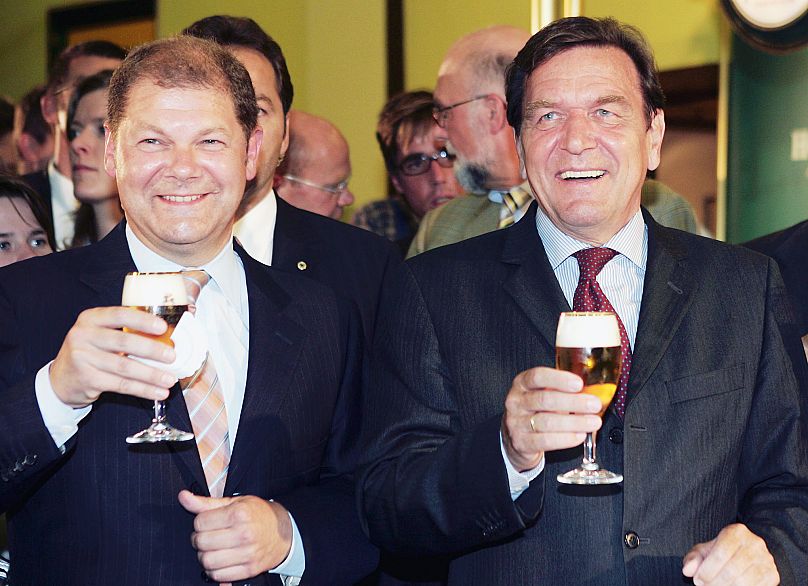He joined the Social Democrats at 17 but has been best-known for his ability to work with the CDU and Angela Merkel.
It was said that in the race to succeed Angela Merkel as Germany’s ninth chancellor earlier this year, Olaf Scholz won by making fewer gaffes than his opponents.
But in reality the former lawyer and Social Democrats-lifer - he joined the party at 17 - had been positioning himself to succeed Merkel for some time.
At least since being appointed her second-in-command in 2018 in the coalition government between the Social Democrats and the Christian Democratic Union.
“He was elected because he is very similar to Angela Merkel - and that was his calculation,” Lars Haider, editor in chief of Hamburger Abendblatt and Scholz’s biographer, told Euronews.
Scholz was credited with the Social Democrats’ surprise win in the 2021 elections, with the party coming from third place in the polls to secure a narrow victory over the CDU. He then quickly assembled a coalition with the German Greens and the pro-business Free Democrats.
Haider, whose book on Scholz will be published in German this week, said that just because Scholz is like Merkel, that does not mean Germany is headed for more of the same. Merkel, he said, was a reactive politician who responded to the political and public mood. Scholz is far more decisive.
“He has clear goals, and he puts things in place in order to achieve them [...]. If it doesn’t work, he says: ‘OK, next time I’ll do it better,” Haider said.
Before he got into politics, Scholz was a lawyer in his native Hamburg before being elected to parliament in 1998. In the 2000s, he became general secretary of the Social Democrats under veteran chancellor Gerhard Schroeder, his political mentor.
When Merkel replaced Schroeder in 2005 and assembled her first grand coalition between the Social Democrats and the CDU, Scholz served as labour minister between 2007 and 2009 and was part of the government that led the country through the financial crisis.
In 2011, Scholz was elected mayor of Hamburg, winning his hometown back for the Social Democrats after years of party-infighting in the city. He was a popular mayor, implementing free daycare for families and embarking on a massive housing building programme.
But in 2017, Scholz came under fire after the G20 in Hamburg was met with violent street protests during which hundreds of police officers were injured. But in 2018, he was given the finance minister brief in Merkel’s second grand coalition as well as the position of vice-chancellor.
But despite his political trajectory, Scholz has his critics. During the Schroeder years, he gained the nickname of “Scholzomat” because of his adherence to the government’s party line (and repetition of Schroeder’s rhetoric) at a time when the SPD was cutting welfare and reforming the economy.
Know-it-all
Within the SPD, there are many on the left that consider Scholz too centrist - or even too right-wing, and when he went for the party leadership in 2019 he was shunted aside in favour of co-leaders Saskia Esken and Norbert Walter-Borjans, prominent figures on the left of the party.
Such criticism is often seen as unfair, given that it was Scholz - as finance minister - that led the efforts to impose a global minimum tax of at least 15% on large companies. He also implemented salary protection schemes that protected jobs during the COVID-19 pandemic.
For Haider, Scholz’s greatest weakness is that he is not a great orator and that he can often come across as a “know-it-all” - something that rubs voters and other politicians up the wrong way.
Scholz also believes that politicians should not convey their emotions, Haider said.
“It's a pity because he is, of course, a completely normal person who has feelings but he always suppresses them,” Haider said.
At a press briefing on Tuesday, Scholz underlined his commitment to the European Union and said he hoped that the bloc would be able to act with "strength and sovereignty" in the years ahead. Scholz also cited the Trans-Atlantic partnership and NATO.
"We want to be a part of the unity of democratic countries. I am very grateful to President Biden that he highlights this aspect of international politics," he said.
"Even when we encourage multilateral engagement, that is always connected to the idea that there is something that connects some countries in a special way, which is the idea of freedom, rule of law, democracy and human rights."
Every weekday, Uncovering Europe brings you a European story that goes beyond the headlines. Download the Euronews app to get a daily alert for this and other breaking news notifications. It's available on Apple and Android devices.












